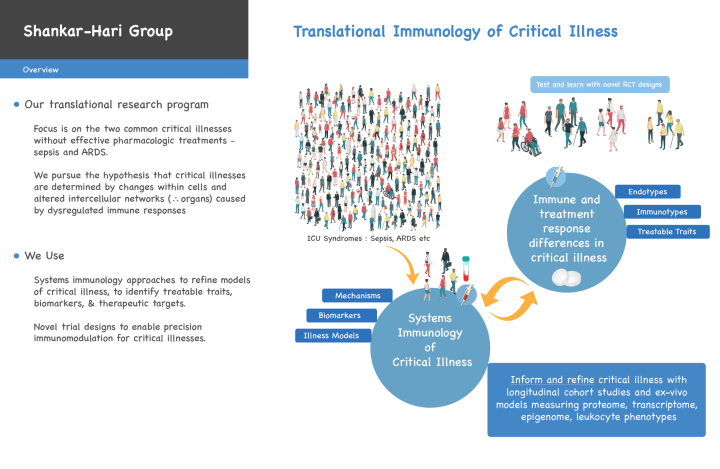Professor Manu Shankar-Hari
Manu's research programme aims to enable precision immunomodulation in critically ill adults with sepsis and acute respiratory distress syndrome (ARDS). Manu's core hypothesis is that modifiable biological networks generate clinical phenotypes, and such networks could be determined by integration of clinical and immunobiology data. Manu leads a globally unique precision medicine programme focussed on critically ill adults: The TRAITS Programme. See Link below.
Professor Manu Shankar-Hari
Chair of Translational Critical Care Medicine / Honorary Consultant in Intensive Care Medicine

Contact details
- Secretary - Susan Keggie: S.Keggie@ed.ac.uk
- Web: TRAITS Programme
Address
- Street
Edinburgh Royal Infirmary
51 Little France Crescent- City
- Edinburgh
- Post Code
- EH16 4SA
Group Members
Post-doctoral researchers
- Dr Jennifer Rynne
- Dr Mia Mosavie
- Dr Peter Smith
PhD Students (Thesis topic)
- Dr Rohit Saha (Design characteristics of ARDS RCTs)
- Ms Renske Hoekstra (MRC Precision Medicine Studentship) - Identifying molecular subtypes of critical illness to inform better treatments using a precision medicine framework.
- Ms Saule Zubyte - Role of cyclic GMP–AMP synthase (cGAS)–stimulator of interferon genes (STING) pathway in acute organ injury in critically ill patients
Clinical Trial managers
- Fiona Wee (TRAITS Trial)
- Dr Kay Russell (GuARDS Trial)
- Emily Lynch (TRAITS Trial)
- Pina Sorbara (GuARDS Trial)
Research Overview
Critical illness is a major cause of morbidity and mortality globally. Even for the two most common critical illness syndromes - sepsis and acute respiratory distress syndrome (ARDS) - there are no effective treatments other than supportive care.
My lab pursues the hypothesis that critical illnesses reflect perturbations within intracellular and intercellular networks that link cells, and organ systems. Illness networks arise from functional interdependencies between the molecular components within human cells. Many of these illness networks are causal and determine clinical phenotypes. Thus, my lab's two focussed research themes of immunobiology and epidemiology converge to a core aim of determining these observable and treatable immunological abnormalities in critical illness (treatable traits).
The immunobiology focus of my lab are the phenotypic and molecular changes in T and B lymphocytes during critical illness and resolution from critical illness, to determine modifiable changes that could improve patient outcomes. This information is used to design seamless early to late phase human randomised clinical trials to translate immune changes into treatments for patients.

Biographical Profile
Manu Shankar-Hari trained in Intensive Care Medicine in London, completed MSc in Epidemiology from the London School of Hygiene and Tropical Medicine, and did his PhD in Immunology at the Peter Gorer Department of Immunobiology at King's College London, UK.
Honours and Awards
- 2019 - Lowry Fink Fellowship, International Sepsis Forum
- 2017 - Global Rising Star in Intensive Care, Australia and New Zealand Intensive Care Society
- 2016 - NIHR Clinician Scientist Fellowship
Alumni
Post-doctoral researchers [Current position]
- Dr Michael Carter, NIHR ACL [Consultant in Paediatric ICM, at Imperial College London]
- Dr Silvia Cellone-Trevelin [Research Integrity Specialist, UK]
- Dr Yasmeen Ghnewa [Research Manager, Action Medical Research]
- Dr Liang Ma, [Scientist, Imperial College London]
PhD students (Thesis title) [Current position]
- Dr Matthew Fish (Longitudinal immune monitoring to identify immune states in sepsis). [PDRA at Tomic Lab, NIEDL, Boston].
- Dr Aislinn Jennings (Characterisation of Lymphocyte receptor repertoire in sepsis).
- Dr Muska Miller (The role of antibiotics, catecholamines and sedatives on immune cell functionality and mitochondrial activity). [ICM Training in London]
- Dr Miranda J Melis (Interplay between stress hormones, mitochondria, and immune cells during sepsis). [Medical student at Netherlands]
- Dr Vera Peters (Fatty acids at cross roads of immune, and metabolic pathways in sepsis). [PDRA in Experimental Cardiology in Cologne, Germany]
Pre-doctoral researchers [Current position]
- Ms Carolyn Lam (Scientist at Astrazeneca)
Other Responsibilities
Internal
- Associate Director, ECAT-I: Wellcome Trust PhD Programme for Health Professionals
- Academic Steering Committee, Precision Medicine Doctoral Training Programme
External
Editor responsibilities
- Deputy Editor, Thorax
- Associate Editor, Intensive Care Medicine
Funding committees
- Board Member, EME Funding Committee
- Chair, EME Advanced Fellowships Joint Funding Committee
Other roles
- Co-Director of Research, UK Intensive Care Society
- Member, WHO Clinical Guideline Development Group
- Domain lead and Member, International Trial Steering Committee, REMAP-CAP Trial
- Council, International Sepsis Forum
- Trustee, Board of Management, Intensive Care National Audit and Research Centre
Collaborators
Internal
- Professor Adriano Rossi, University of Edinburgh
- Professor Kev Dhaliwal, University of Edinburgh
- Dr Sohan Seth, University of Edinburgh
- Professor Kenneth Baillie, University of Edinburgh
- Professor Rashan Haniffa, University of Edinburgh
- Dr Abi Beane, University of Edinburgh
- Professor Christopher Weir, University of Edinburgh
- Dr Karen Mackenzie, University of Edinburgh
- Dr Nazir Lone, University of Edinburgh
- Dr Annemarie Docherty, University of Edinburgh
- Dr David Griffith, University of Edinburgh
External
- ICNARC
- Professor Jo Spencer
- Dr Chad Swanson
- Carolyn Calfee
- Charlotte Summers
- Cecilia O’Kane
- Francois Lamontagne (Canada)
- Iain McInnes
- Danny McAuley
- Julian Knight
- Intensive Care National Audit and Research Centre
Funding
Manu's group is funded primarily by grants from the NIHR; NIHR HTA programme; MRC-EME programme; MRC; National Institute of Academic Anaesthesia; HDR UK; UKRI COVID-19 Funding
Sources of funding held in CIR :
- NIHR HTA programme
- MRC-EME programme
- HDR UK
- Chief Scientist Office

